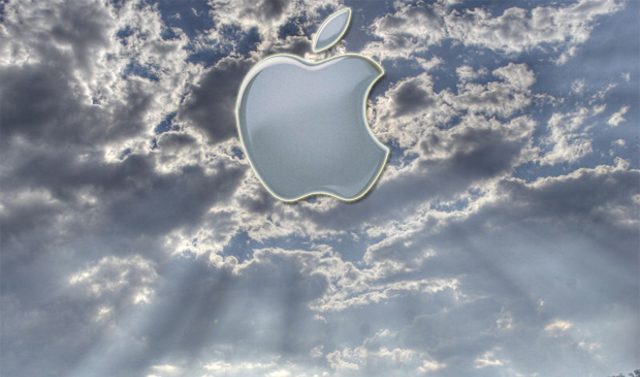
A lot of people worry about the decline of religious observance in America, but that’s only because their definition of “religion” is too narrow. If Apple Inc. had a church for its faithful members to gather in, it would be filled to capacity every single week, all those people reverently bowing their heads, playing with their iPhones, just like in regular church.
Appleism — also known as iDolatry — is the fastest-growing religion in America, gaining adherents more rapidly and steadily than even Justin Bieberism or Oprah’s Witnesses. Each year, millions of zealots breathlessly await whatever new revelation Apple’s leader, Steve Jobs, will bring them from atop his mountain, which is made out of money. Sometimes it’s merely an update to a previous doctrine, like when it became permissible to use Microsoft products on an Apple computer. But sometimes it’s a whole new system of worship, like when Jobs told us we had to start storing our music inside a fragile handheld box and carry it around with us all the time.
Nobody wanted to do that. It was one thing to have a Walkman or Discman that enabled you to have an hour’s worth of music with you when you were on the go. But your entire music collection? Every sound recording you own? Hundreds of hours of music constantly at your fingertips? That was silly. You don’t need 5,000 songs with you, not unless you’re going into space. In fact, it was so absurd that people had to start making NEW recordings, called “podcasts,” in order to justify the existence of the iPods. “Well, of course you need an iPod!” they’d say. “How else are you going to listen to these new podcasts??” And sure enough, because everyone exercised faith in Steve Jobs and did what he told them to do, we grew accustomed to the idea, and now the thought of being without entertainment for more than five minutes at a time is unbearable.
Apple has continued to bestow new treasures upon its people regularly. After the iPod came the iPhone, which led tragically to a million dumb jokes centered on the phrase “there’s an app for that.” Then came the iPad, which is just like the iPhone only bigger and not a phone. All of these devices promised even more ways for us to ignore the people we were having dinner with.
Last week Apple released the new operating system for its desktop and laptop computers, called Lion. The last several updates have been named after members of the cat family: Cheetah, Tiger, Leopard, and so forth. A Mac is like a cat, after all: it can generally clean itself up without assistance, it thinks it’s better than you, and people who own a lot of them tend to be weird. Microsoft, not to be outdone, has named each version of its Windows operating system after an appropriate animal: Snail, Sloth, Old Yeller, Disease-Ridden Sewer Rat, Australian Failing Toad, etc.
Appleists’ response to the new Lion system was speedy and unanimous. They said, as if with one voice, “This is definitely a thing that we paid thirty dollars for!”
In the interest of full disclosure, I should mention that I am an Appleist myself. I have been since high school, when a friend introduced me to the Macintosh. I was an easy convert; the computers I’d known in my youth were fine for playing Lemonade Stand and Oregon Trail, but they hadn’t really spoken to me on a personal level the way Apple did. I’ve been a stalwart Appleist ever since, using Windows-based computers only when there has been no other option, such as when I worked in a PC-based office, or when I visited my parents. (America’s parents continue to be the most consistent users of PCs, usually dusty, antiquated models with dial-up modems and AOL accounts and other viruses.)
Skeptics mock the enthusiasm of Apple’s most ardent supporters. “Those Apple fanboys are so gullible!” they say. “If Steve Jobs were to poop in his hand, call it the iPoo, and sell it for $499, everybody would buy it!” This is an exaggeration, of course. First the Appleists would complain that the iPoo didn’t have a video camera, and THEN they would buy it. After buying it, they would continue to whine about the features it’s missing while also urging everyone they know to buy one. “No, it doesn’t support Flash,” they would say. “But still, as far as handfuls of poop go, the iPoo is amazing. It’s the way of the future.” A year later, when iPoo 2 comes out, these same people would line up to buy it, even though it’s exactly the same as the first iPoo except for now being available in two colors.
Some of Apple’s success can be attributed to the company’s ingenious system for testing new products. Standard practice is to perform “beta tests,” wherein a handful of people use a product before it goes on sale and determine what its flaws are and what defects its software might have. The people testing the product for you don’t have to buy it, of course; you give it to them for free, in exchange for their valuable feedback. But Apple doesn’t do this. Apple has streamlined the process by putting its new products on sale immediately, as soon as Steve Jobs excretes them, and letting the people who buy them serve as beta testers. People will camp for days outside an Apple store just so they can be among the first fans who get to spend $500 on a new thing and then dutifully inform Apple of all the things that are wrong with it. Sure, you could wait until the new and improved version comes out. But if you do, the fundamentalist Appleists will look at you askance and question your faith, and you run the risk of being labeled an Appostate.
_____________________________________________





